
Fourth in a nine-part series on GCU academics
By Rick Vacek
GCU News Bureau
Dr. Randy Gibb used to teach members of the Air Force how to fly military jet aircraft and led flying squadrons. Within the many intricacies of those experiences was an embedded, crucial goal: safe operations.

“You can’t just say, ‘Oh, we’re safe. We’re going to fly safely while we accomplish our operational mission.’ It needs to be in everything you do,” said Gibb, who served in the military for 26 years and retired as a colonel in 2012. “It has to be part of who you are. You have to live it every day. You can’t just flip a switch.”
Gibb has dedicated himself to an equally clear mission in his five years as dean of the Colangelo College of Business (CCOB) at Grand Canyon University: The ideals of business as a force for good, spelled out in the principles of Conscious Capitalism, are embedded in everything the college teaches. He wrote this blog about what it means to be a business school designed for the future.
Conscious Capitalism is all about higher purpose, stakeholder integration, culture and leadership, and Gibb is most definitely leading the way in making sure CCOB promotes free enterprise and the ideals of elevating humanity and helping people flourish.
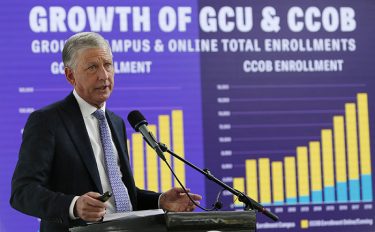
“He fosters that,” marketing instructor Mindy Weinstein said. “I always feel like when there’s a culture, there’s someone at the top who’s cultivating that culture. It definitely comes from Randy.”
And it filters throughout the faculty as well. CCOB has 12 courses, both undergraduate and graduate, filled with Conscious Capitalism activities and assignments, but the habits of servant leadership as they relate to business ministry are taught throughout the college.
It falls right in step with GCU President Brian Mueller’s five-point plan to create jobs, education and safety at the University and in its west Phoenix neighborhood.
It is exactly the approach that made the college’s namesake, Jerry Colangelo, the most successful businessman in the history of Arizona.

CCOB doesn’t just teach subjects like accounting. It teaches accountability.
“No matter what class it is, I always have a day that I call personal branding,” Weinstein said. “I have a worksheet that I have students do. What do you stand for? What do you care about? What do you want your life to look like? What do you want people to say about you?
“The last question I’ll ask is, ‘Now go on to your social media. Everything you just wrote down, is that what’s reflected on Instagram? Is that what’s reflected on Snapchat? Even on LinkedIn?”
The personal touch extends through career advice. On Tuesday, a student asked Weinstein, “How can I be successful in a marketing career?”
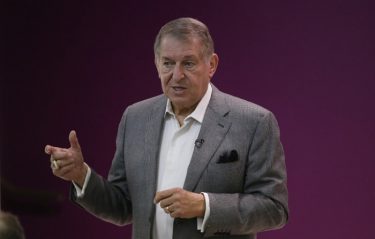
Her response: “How can you be successful in a career?”
“I said it comes down to work ethic, and it starts now. How do you approach things? How hard do you work? What is your integrity like? Can people count on you? Do you do what you say you’re going to do? That’s how people start to get recognized, but it’s hard work, too. You don’t just do part of it, you do all of it. That’s how you succeed.”
Another CCOB instructor, Mark Jacobson, said he gives students career advice “all the time,” and not just to connect them to companies. He also helps them if they want to start their own entrepreneurial venture.
“I’m not an academic. I came out of industry four years ago. I was a hiring manager most of my career in big departments. I hired 20-year-olds. I’m a big believer in this integration between the classroom and your career.
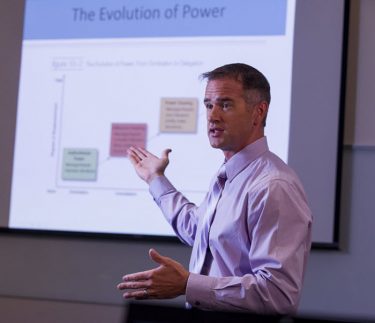
“And so I talk a LOT about opportunities, creating your own business, going into a big company or small company, whatever it is. This is a time to plan, ask questions, investigate, figure it out.”
That also means figuring out how to handle tough situations. Ed Slover, who teaches organizational behavior and management, focused on moral, immoral and amoral behavior in his class Wednesday morning. He told his students that their careers will come down to 10 to 15 five-second decisions that will fall under one of those categories.
He never uses the term “real world,” as in, “When you get out in the real world …” Here’s why:
“We all live in the real world. I don’t think college is this separate world. I understand what people mean by that – OK, so these students aren’t yet financially independent – but they live in the real world. So I make it the work world.
“They’re really bright, young adults. They really are. I think the most challenging thing about teaching is that conceptually they get it; the difference between me and them is that I’ve lived about 12 million more minutes, so there are a lot of successes and failures in those minutes. When I’m describing something, I know what it feels like above and beyond the concept of it.”
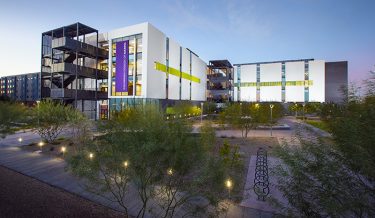
He also knows how sacred a person’s name is, so he writes down the names of the students in the order they were sitting in each class and studies those charts between classes. It’s a daunting task – he has more than 260 students.
“To me, it’s a responsibility that everyone feels included,” he said. “When you remember someone’s name, especially after the first time you’ve met them, that leaves an impression.”
CCOB is right in line with the changing business culture, led by leaders such as Mueller. Larry Fink, CEO of BlackRock, a wealth-management firm on Wall Street, said in 2018, “Without a sense of purpose, no company, either public or private, can achieve its full potential. It will ultimately lose the license to operate from key stakeholders.”
And then in 2019 he followed with, “Profits are essential if a company is to effectively serve all of its stakeholders over time – not only shareholders, but also employees, customers and communities.”
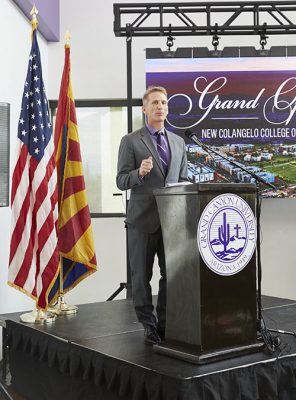
Aligning with Gibb’s comments, Fink connected a company’s articulated purpose with hiring: “Attracting and retaining the best talent increasingly requires a clear expression of purpose.”
CCOB’s commitment to Conscious Capitalism surfaces in a variety of ways.
Two examples:
When Gibb visited a management class and students were talking about how Boeing handled the problems with its 737 Max jet earlier this year, the final slide of the presentation addressed how the handling of the crisis reflected on the company as a Conscious Capitalism business.
And when marketing instructor Scott McIntosh, who leads Arizona’s Conscious Capitalism chapter, got into an Uber, he was pleased to find that the driver was a CCOB student who talked authoritatively about – you guessed it – Conscious Capitalism.
Yep, it’s the culture. But it hasn’t been easy to attain.
“I’ve spoken with a number of other people from other universities who want to integrate it and I’ve told them, ‘It’s going to take a long time. You don’t just teach one course on it,’” Gibb said. “I really think how we’ve done it has been the most effective way, by sprinkling it in across 12 different courses and throughout the culture.”
That’s how, he said, you “evolve as a business school to what’s needed in 2030.” That’s how Conscious Capitalism has taken flight at GCU.
Contact Rick Vacek at (602) 639-8203 or [email protected].
****
Related content:
GCU Today: CCOB dean shows students why he's sold on Conscious Capitalism
GCU Today: 'Conscious Capitalism' leader shows students a new way to do business
GCU Today: How CCOB's 'Lopes First' culture benefits students



































































